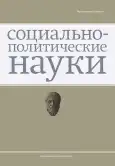Sociological Analysis of the Role of the Media in the Formation of Trust in Artificial Intelligence
- 作者: Razov P.V.1, Garaganov A.V.1
-
隶属关系:
- Financial University under the Government of the Russian Federation
- 期: 卷 13, 编号 1 (2023)
- 页面: 74-79
- 栏目: Sociopolitical research
- URL: https://journals.eco-vector.com/2223-0092/article/view/545872
- DOI: https://doi.org/10.33693/2223-0092-2023-13-1-74-79
- ID: 545872
如何引用文章
详细
This article discusses the issue related to the sociological analysis of the role of the media in the formation of trust in artificial intelligence. The author studied the fields of application of artificial intelligence, its relationship with the media, as well as the concept of natural language processing. Natural language processing is one of the newest technologies of artificial intelligence application and can be integrated by mass media into the process of writing reports and texts. An important place in this work is given to the author’s research conducted in August 2022. The purpose of this study was to identify the relationship between how people relate to the media and artificial intelligence, and how they evaluate headlines created by journalists or AI. The results of the study revealed similarities between texts compiled by artificial intelligence and texts written by journalists. In the final part of the article, the authors formulated the main recommendations for increasing confidence in artificial intelligence in the context of media influence on it. The key conclusion of this scientific work is the following aspect: with automatic text generation, consumers’ perception of the quality of news plays an important role in establishing the relationship between people and artificial intelligence.
全文:
作者简介
Pavel Razov
Financial University under the Government of the Russian Federation
Email: PVRazov@fa.ru
Doctor of Sociology, Professor, Professor at the Department of Sociology, History and Philosophy
俄罗斯联邦, MoscowArtur Garaganov
Financial University under the Government of the Russian Federation
编辑信件的主要联系方式.
Email: arturcompany21@gmail.com
researcher at the Locomotives of Growth Center of the Department of Sociology
俄罗斯联邦, Moscow参考
- Aleynikova Yu.V., Matveev V.V. Digital ecosystem. analysis of the use of artificial intelligence. Health – the Basis of Human Potential: Problems and Ways to Solve Them. 2020. No. 3. Pp. 1480–1487. (In Rus.)
- Buryak M.A. Media sphere: Conceptualization of the concept. Bulletin of St. Petersburg State University. Language and Literature. 2014. No. 2. Pp. 200–212. (In Rus.)
- Vidyasova L.A., Vidyasov E.Yu., Tensina Ya.D. Research of social trust in information technologies in the provision of electronic public services and the use of electronic participation portals (case of St. Petersburg). Monitoring. 2019. No. 5 (153). Pp. 43–57. (In Rus.)
- Dolganova O.I. Improving the customer experience of interaction with artificial intelligence by observing ethical principles. Business Informatics. 2021. Vol. 15. No. 2. Pp. 34–46. (In Rus.)
- Zhukov D.S. Artificial intelligence for the socio-state organism: The future has already started in China. Journal of Political Studies. 2020. Vol. 4. No. 2. Pp. 70–81. (In Rus.)
- Koda E.A. The influence of mass media on the formation of public opinion. Sociology in the Modern World: Science, Education, Creativity. 2020. Vol. 1. No. 12. Pp. 131–134. (In Rus.)
- Larin S.N., Elizarova M.I., Sokolov N.A. Analysis of the development of the world market of high-tech products on the example of artificial intelligence technologies. Economics and Business: Theory and Practice. 2019. No. 5-2. Pp. 119–129. (In Rus.)
- Lebedev A.N. Trust and distrust of unreliable information on the Internet. Institute of Psychology of the Russian Academy of Sciences. Social and Economic Psychology. 2020. Vol. 5. No. 2. Pp. 365–389. (In Rus.)
- Loshkarev A.V., Dydygina Yu.N. Issues of the digital environment of trust. International Journal of Humanities and Natural Sciences. 2020. No. 10-3. Pp. 124–126. (In Rus.)
- Malyshkin A.V. Integration of artificial intelligence into public life: Some ethical and legal problems. Bulletin of St. Petersburg University. Right. 2019. Vol. 10. No. 3. Pp. 193–199. (In Rus.)
- Sineva N.L. et al. Innovative and technological development and artificial intelligence. Innovative Economy: Prospects for Development and Improvement. 2019. No. 2 (36). Pp. 397–404. (In Rus.)
- Yastreb N.A. How does the problem of personal data change the ethics of artificial intelligence? Philosophical Problems of Information Technologies and Cyberspace. 2020. No. 1 (17). Pp. 491–504. (In Rus.)
- Andras A. et al. Trusting intelligent machines: Deepening trust within socio-technical systems. IEEE Technology and Society Magazine. 2018. No. 37 (4). Pp. 76–83.
- Cassidy W.P. Online news credibility: An examination of the perceptions of newspaper journalists. Journal of Computer Mediated Communication. 2020. Vol. 12. No. 2. Pp. 144–164.
- Flanagin A.J. Credibility and trust of information in online environments: The use of cognitive heuristics. Journal of Pragmatics. 2021. Vol. 59. Pp. 210–220.
- Gretton C. Trust and transparency in machine learning-based clinical decision support. J. Zhou, F. Chen (eds.). Human and Machine Learning, 2018. Pp. 279–292.
- Strubell E., Ganesh A., McCallum A. Energy and policy considerations for deep learning in NLP. arXiv preprint arXiv:1906.02243. 2019. Vol. 9. No. 1. Pp. 291–307.
- Wagner A.R. et al. Overtrust in the robotic age. Communications of the ACM. 2018. No. 61 (9). Pp. 22–24.
补充文件













